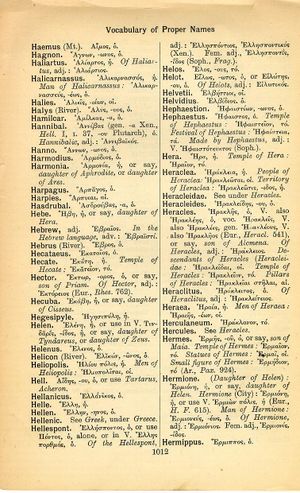Herculaneum: Difference between revisions
τραχὺς ἐντεῦθεν μελάμπυγός τε τοῖς ἐχθροῖς ἅπασιν → he is a tough black-arse towards his enemies, he is a veritable Heracles towards his enemies
(3_6) |
m (Text replacement - "}}]]" to "}}]]") |
||
| Line 1: | Line 1: | ||
{{WoodhouseENELnames | {{WoodhouseENELnames | ||
|Text=[[File:woodhouse_1012.jpg|thumb | |Text=[[File:woodhouse_1012.jpg|thumb | ||
|link={{filepath:woodhouse_1012.jpg | |link={{filepath:woodhouse_1012.jpg}}]]Ἡράκλανον, τό. | ||
}} | }} | ||
{{Lewis | {{Lewis | ||
Revision as of 10:07, 15 August 2017
English > Greek (Woodhouse)
Ἡράκλανον, τό.
Latin > English (Lewis & Short)
Hercŭlānĕum: (Hercŭlānĭum, Plin. 3, 5, 9, § 62; but the modern form Herculanum is not Lat.; in Cic. Att. 7, 3, 1, read Aeculanum; v. Orell. ad loc.), ĕi, n., = Ἡράκλειον,
I a town of Campania, situated on the sea-coast, between Naples and Pompeii, and buried along with the latter city by an eruption of Vesuvius, A. D. 79, Mel. 2, 4, 9; Plin. 3, 5, 9, § 62; Sisenn. ap. Non. 207, 9; Liv. 10, 45; Vell. 2, 16, 2; Sen. Q. N. 6, 26 fin.; Flor. 1, 16.—
II Derivv.
A Her-cŭlānĕus (-lanus), a, um, adj., of or belonging to Herculaneum, Herculanean: via, Cic. Agr. 2, 14, 36; Plin. 15, 18, 18, § 72; Cloat. ap. Macr. S. 2, 16.—Form Herculanus: ficus, Cato, R. R. 8, 1: via, Flor. 4, 8, 6.—
B Hercŭlānensis, e, adj., the same: fundus, Cic. Fam. 9, 25, 3; for which absol.: villa in Herculanensi, in the vicinity of Herculaneum, Sen. de Ira, 3, 22. —Subst.: Hercŭlānenses, ĭum, m. plur., the inhabitants of Herculaneum, Herculaneans, Inscr. Grut. 439, 6.
Latin > French (Gaffiot 2016)
Hercŭlānĕum,¹⁵ ī, n.,
1 Herculanum [ville de Campanie détruite par une éruption du Vésuve en 79] : Sen. Nat. 6, 26, 2
2 ville du Samnium : Liv. 10, 45, || -nēnsis, e, d’Herculanum : Cic. Fam. 9, 25, 3 ; subst. n. in Herculanensi Sen. Ira 3, 21, 5, sur le territoire d’Herculanum.
Latin > German (Georges)
Herculāneum, eī, n., I) Stadt in Kampanien, 7 km östl. von Neapel (westlich vom heutigen Flecken Torre del Greco), die zur Zeit des Kaisers Nero durch ein Erdbeben teilweise verwüstet, dann unter Titus i. J. 79 n. Chr. durch den Ausbruch des Vesuv gänzlich verschüttet, im J. 1720 n. Chr. unter dem heutigen Portici und einem Teile des heutigen Resina wieder entdeckt u. teilweise ausgegraben wurde, Sisenn. hist. 4. fr. 54 (bei Non. 207, 9). Vell. 2, 16, 2. Sen. nat. qu. 6, 26, 5. Mela 2, 4, 9 (2. § 70). Plin. 3, 62. Flor. 1, 16, 6. – Dav.: A) Herculānēnsis, e, herkulanensisch, fundus Cic.: oppidum, Sen.: litus, Sen.: plebs, Corp. inscr. Lat. 10, 1435. – subst., in Herculanensi, auf dem herkulanensischen Gebiet, Cic.: Herculanēnses, ium, m., die Einwohner von Herkulaneum, die Herkulanenser, Corp. inscr. Lat. 10, 1492. – B) Herculāneus u. Herculānus, a, um, herkulanisch, Herculanea ficus, Cato r. r. 8, 1. Cloat. bei Macr. sat. 2, 16, 1. Plin. 15, 70 u. 72: Herculanea via, der nach Herkulaneum führt, Cic. de lege agr. 2, 36: ders. Herculana via, Flor. 4, 8, 6: Herculaneus pagus, Corp. inscr. Lat. 10, 3772: ders. Herculanus pagus, ibid. 6664. col. 2 a. E. – II) Stadt in Samnium, nach Reich. j. M. Arazzo, Liv. 10, 45, 10.

